| "Well, if President Trump runs for reelection, I believe he would defeat Joe Biden, and I don't want Kamala Harris to have the power." - Republican Senator Marco Rubio agrees with former Vice President Mike Pence that the vice president can't overturn an election, but avoids saying former President Trump is wrong to suggest it. Welcome to the "Face the Nation" Five at Five newsletter. Scroll down for your five takeaways from today's broadcast of "Face the Nation with Margaret Brennan" on CBS. Did someone forward you this? Sign-up at cbsnews.com/email. 1. Rubio: "I just don't think" the VP can overturn an election 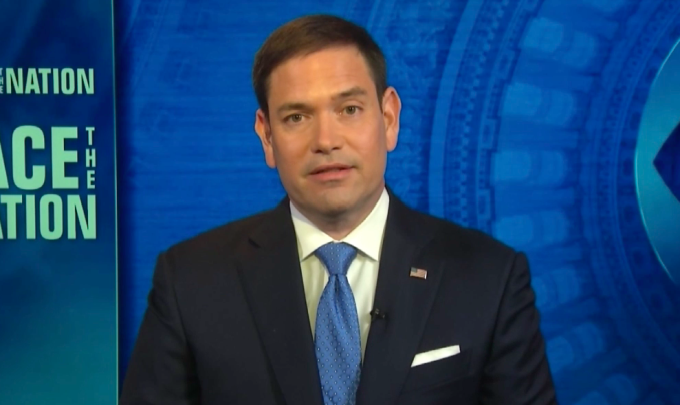 Republican Senator Marco Rubio of Florida said Sunday that he believes "vice presidents can't simply decide not to certify an election," which contradicts what former President Trump has continued to claim - even just last week. What we asked: "Senator, we invited you to come on the show to talk about China. I want to get there, but I have to start here. Do you agree with Mike Pence?" What Rubio said: "Well, if President Trump runs for reelection, I believe he would defeat Joe Biden, and I don't want Kamala Harris to have the power as vice president to overturn that election, and I don't- that's the same thing that I concluded back in January of 2021. You know, when that issue was raised, I looked at it, had analyzed it and came to the same conclusion that vice presidents can't simply decide not to certify an election." Why it matters: While the assault on the U.S. Capitol occurred more than a year ago, Trump has continued to falsely claim that former Vice President Mike Pence could have rejected electoral votes from key battleground states where he lost. 2. McMaster: January 6 was "illegitimate political discourse" 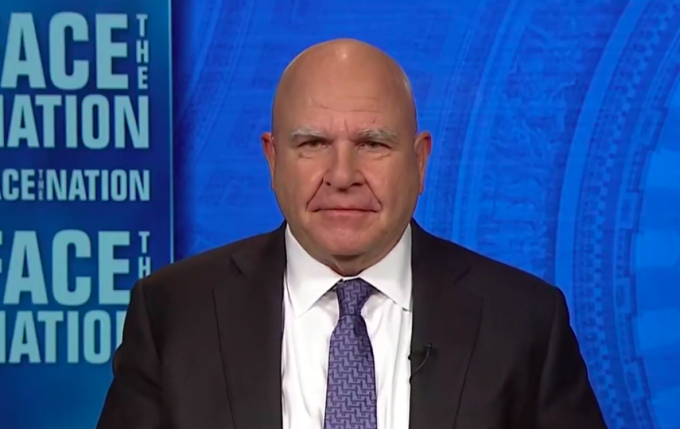 Former Trump national security adviser General H.R. McMaster split from the Republican National Committee's (RNC) characterization of the January 6 assault on the U.S. Capitol. What we asked: "Do you believe January 6 was in any way legitimate political discourse?" What McMaster said: "No, it was- it was illegitimate political discourse because it was an assault on the first branch of government. And so I think it's really important for us to come together now, Margaret. And you know, I mean, I really think it is possible to improve the transparency in the security of our elections while ensuring that every eligible voter gets to vote. So, I think what we need to do is stop posturing across these political parties and begin conversations with what we can agree on. I mean, your show has been great. I got to listen to the whole thing to be here at the end, but it is pretty clear that we are emerging from a number of traumas of the past couple of years, and it's time for Americans to come together and to restore our confidence in who we are as a people and in our democratic principles and institutions and processes. And of course, Russia preys on our weaknesses in the divisions and tries to portray democracy as weak. But you know, Margaret, I believe that totalitarianism is fragile and weak and democracies are resilient and we can work together and- and come out of these traumas stronger." Why it matters: The RNC on Friday approved a resolution to censure GOP Representatives Liz Cheney and Adam Kinzinger for sitting on the House select committee investigating the January 6 attack, calling the participants "ordinary citizens engaged in legitimate political discourse." 3. Deputy Treasury Secretary Adeyemo: "China can't give Russia what they don't have" 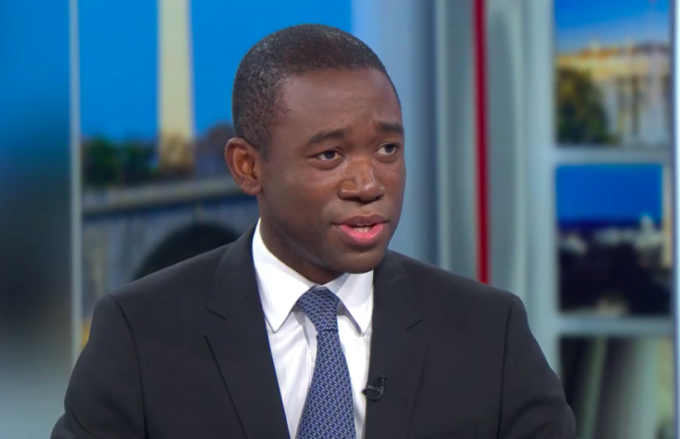
Wally Adeyemo, deputy Secretary of the Treasury, discussed the effect sanctions could have on Russia's economy if Russian President Vladimir Putin decides to invade Ukraine.
What we asked: "How effective can U.S. and Western sanctions be if Russia is just going to move closer to China, as we're seeing?" What Adeyemo said: "So, Margaret, I was in the Obama administration in 2014 when we took actions against Russia in response to their invasion of Ukraine. We've learned a great deal of lessons, and what I can tell you is the actions that we would take if Russia were to invade Ukraine this time would be far more significant. And it's up to President Putin if he wants to become dependent on China going forward. What I'll tell you is that China can't give Russia what they don't have. There are critical technologies that Russia is dependent on the United States and our allies on, technologies that Russia, that China does not have access to. Russian elites who we would cut off from the global financial system are not putting their money in China. They're putting their money in Europe and in the United States. And those elites, those who are helping President Putin make these decisions, we would cut them and their families off from the global financial system in ways that would limit their ability to do business in the ways they've done it in the past." Why it matters: Sources tell CBS News that Putin has assembled about 70% of the forces that he would need for a full invasion of Ukraine, while Putin and Chinese President Xi Jinping were seen together at the 2022 Beijing Winter Olympics opening ceremony -- calling into question what effects sanctions could have on Russia. 4. Gottlieb: Schools may soon start lifting mask mandates 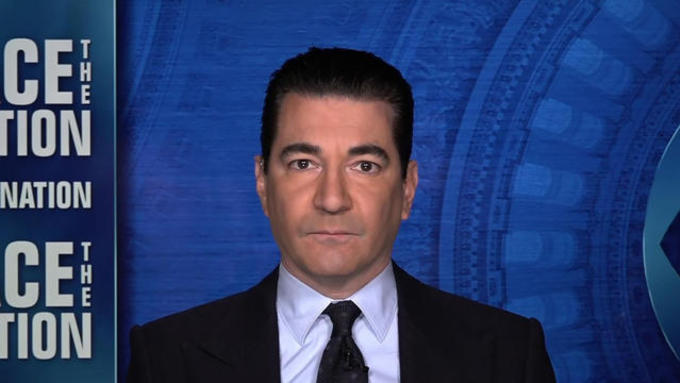 Dr. Scott Gottlieb, the former head of the Food and Drug Administration, suggested mask mandates in schools may soon be lifted in areas where "we've seen prevalence come down." What we asked: "The governor of Virginia, we talked about on this program, you know, lifted the mask mandate for schools and ... on January 23, when I asked you what should be done here, you said that was too early, but in two weeks we'd be in a place where mask mandates could be lifted. So that puts us right where we are right now. Can mask mandates be lifted in most schools?" What Gottlieb said: "Look, I think you're going to see governors start to do that. I think we're two weeks out, we've seen prevalence come down. Connecticut, their mask mandate is - expires on February 15. I would expect that that's not going to be renewed, and schools in the state of Connecticut will very quickly lift mask requirements for students. I think you're going to see the same thing in New York, New Jersey, other states where Omicron has come down, where vaccination rates are especially high. I think you're going to see states do that. And we're at a point where we can safely contemplate that. That doesn't mean that this isn't going to continue to spread. But when prevalence is low, you have a lot of people who've been infected who have some level of immunity for a period of time and you have high vaccination rates, we can start to lean forward and take a little bit more risk and try to at least make sure that students in schools have some semblance of normalcy for this spring term. A lot of kids haven't really known a normal school day for two years now, so we want to- we need to try to lean forward aggressively to try to restore that and reclaim it when we can." Why it matters: A bipartisan group of governors met with President Biden recently to discuss transitioning from a pandemic to an endemic when it comes to COVID guidelines, signaling a possible turning point in the pandemic despite the U.S. still seeing around 2,400 COVID deaths per day. 5. Our "Listening to America" panel on kids and vaccines 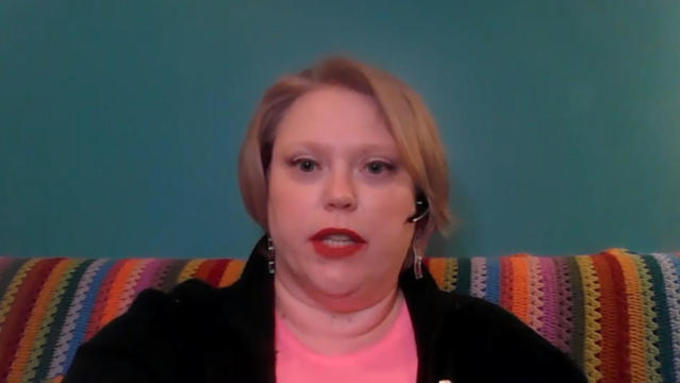 This week we gathered a "Listening to America" focus group of parents, who give their perspective on parenting during the pandemic, and the prospect of soon being able to get very young children vaccinated. Watch here. Margaret Brennan's Watch Magazine cover story 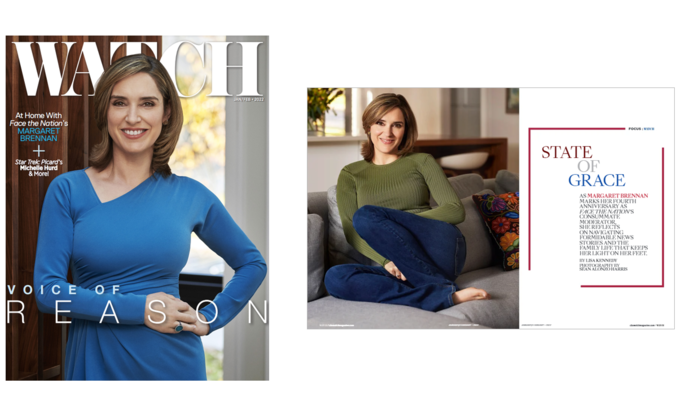 Margaret Brennan is on the cover of the January/February 2022 issue of CBS Watch Magazine, out now. Celebrating her fourth anniversary as moderator of America's #1 Sunday morning public affairs program, Brennan talks about the keys to her success, her top moments on the show and a bit about her life at home. Leaf through the digital edition here. |
Post a Comment
0Comments